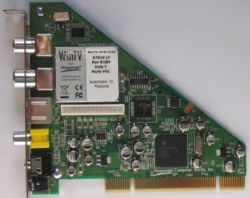Hauppauge WinTV-HVR-1110
The Hauppauge WinTV-HVR-1110 is a hybrid receiver card (analog and DVB-T).
It sometimes ships in a HVR-1100 box. The HVR-1110, however, is of triangular shape, while the HVR-1100 board is a typical rectangular shaped card. There are significant component differences too. See here for more details.
The HRV-1110 uses the following components:
- a Philips SAA7131 A/V decoder & bridge
- a Philips TDA10046 digital demodulator
Installing the HVR-1110 to Work Under Fedora Core 6
The Howto applies to a x86_64 architecture running Fedora Core 6 and kernel 2.6.20-1.2933.fc6.
Installing the SAA7134 Driver
The analog tuner of the HVR-1110 runs out of the box. The kernel moduls are already included in the 2.6.20 kernel. No driver installation is required. Look out for something like
kernel: saa7130/34: v4l2 driver version 0.2.14 loaded
in the /var/log/messages to make sure the driver is loaded.
Installing the SAA7134-dvb Modules
In order for the DVB-T to work an additional module, SAA7134-dvb, and the firmware has to be installed. First of all, check whether the module is already installed. Scan through
dmesg
and look out for something like
DVB: registering new adapter (saa7133[0]). DVB: registering frontend 1 (Philips TDA10046H DVB-T)...
If you find that, than the SAA7134-dvb kernel module is already installed. Please not that in this case the HVR-1110 is the second DVB card registered in the system. You see that since frontend is 1 and not 0. If kernel module is not installed, load it into the kernel like this
modprobe saa7134-dvb.
This should automatically create a folder in /dev:
/dev/dvb/adapterN
where N is an integer. The first dvb card will be numbered starting at N=0, each following card will increase N by one. Issue an
dmesg
command to check whether the kernel module has been loaded. Output should be
DVB: registering new adapter (saa7133[0]) DVB: registering frontend 1 (Philips TDA10046H DVB-T)...
Installing the Firmware
This card requires a firmware file (dvb-fe-tda10046.fw) for the demodulator, which can be obtained using the get_dvb_firmware perl script included in the kernel sources:
# cd /[kernel source directory]/Documentation/dvb/ # perl get_dvb_firmware tda10046
Once the download is complete, place a copy of the firmware file in your /lib/firmware directory. (This directory may differ with some distros; consult your distro's documentation for the appropriate location).
Making the Modules Load into the Kernel at Startup
In order that the saa7134-svb module gets loaded at startup add following line
install saa7134 /sbin/modprobe --ignore-install saa7134 && { /sbin/modprobe saa7134-alsa; } && { /sbin/modprobe saa7134-dvb;}
to the modprobe.conf in
/etc/modprobe.conf
Now check whether everything is working as it should. Restart the PC and check the /var/log/messages. Look out for something like:
kernel: DVB: registering new adapter (saa7133[0]). kernel: DVB: registering frontend 1 (Philips TDA10046H DVB-T)...
telling you the dvb modules got loaded. Please note that in this case the system has two DVB cards. The second one (frontend 1) is the HVR 1110.
kernel: tda1004x: found firmware revision 20 -- ok
tells you that firmware has also been loaded.
Next Step
The next step is to create a channels.conf. To this end follow the link Testing your DVB device
Notes
The HVR-1110 requires http://linuxtv.org/hg/v4l-dvb/rev/40d58d92d183 for Audio in (S-Video and Composite) and Radio support. Sound redirect (sox or arecord) is required if you use Tvtime or Xawtv, Mplayer,Mythtv can use the sound directly.
Installing the HVR-1110 to Work Under Gentoo
For the sake of completes, here are the installation instructions for Gentoo.
